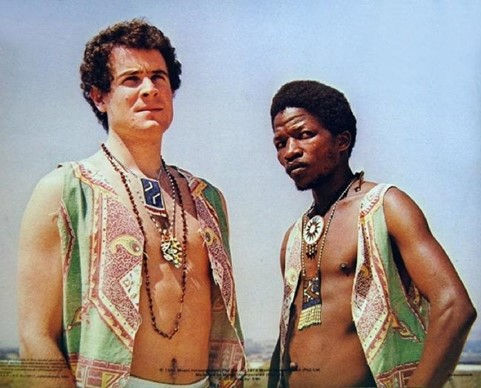Remembering Johnny Clegg - A True Scatterling of Africa
- Dec 30, 2022
- 4 min read
By Hannah Thorpe

Johnny Clegg and Sipho Mchunu dancing onstage - Media24
Born in England and growing up in Zambia, Zimbabwe, and South Africa, Johnny Clegg often travelled to townships with his mother at an early age. This exposed him to a broader cultural perspective than that of his peers. As a teenager in Johannesburg, he came across a man playing the Zulu guitar and was enchanted by the melody. He asked the man, Charlie Mzila (who eventually became his mentor), to teach him how to play in that style, which was called Mbeqanga - a genre of South African music with rural Zulu roots.
On weekends he would go to the migrant hostels in Joburg, where miners from KwaZulu-Natal lived and no other white people dared to go. Here, he immersed himself in this music and culture called Maskandi. Whilst in his mid-teens he mastered the Zulu language, the Maskandi guitar, and the Ishishameni dance styles of the migrants.
Clegg also developed an innovative aspect of his performances that employed the cultural and ethnographic knowledge he had acquired in Wits University’s Department of Social Anthropology and in the hostels. He not only mastered the anthropological theories but also delved into the culture and distributed it.
His passion for dance and music influenced him to study the Zulu culture, eventually meeting other musicians and forming a band called Juluka (sweat), with fellow guitarist and singer Sipho Mchunu. In 1976, the duo enlarged their interracial band, secured a major record deal, and made their first hit song, Woza Friday. A period of development followed when Clegg worked on bringing together English lyrics, Western melodies, and Zulu musical structures. Playing in mixed-race bands was strictly prohibited during the Apartheid era so Juluka could not play in regular venues and often had to contend with authorities. Radio stations would not play their music either. This led them to perform in homes, churches, universities, and other non-traditional venues. In 1979, Juluka’s first album, Universal Men, was released. While they were gaining interest in Europe and the USA, they were not allowed to be in the media in South Africa.

Johnny Clegg and Sipho Mchunu – greenglobaltravel.com
Juluka was outspoken about the Apartheid regime and this belief was to become the main ingredient in the message that their music delivered. Through his music and activism, Clegg sought to unify cultures under the Apartheid government, whose intent was to do the opposite. Their hit song, Scatterlings of Africa, was released in 1983 and launched their international career. When Juluka disbanded in 1985, Johnny formed another band in 1986 called Savuka (we have risen), who toured Europe extensively in 1986 and 1987. Savuka recorded their first album, Third World Child, in 1986.
When Apartheid came to an end in 1994, Johnny changed the message in his songs to make people aware of the challenges that people still face. The message was always one of freedom, unity, and compassion through song and dance. Johnny’s songs were also lyrically brilliant. Even if the intention of the lyrics were politically driven, the way they were written was in such a subtle yet powerful manner.

Savuka - Afropop World
In 1999, Johnny Clegg performed in Frankfurt, Germany, singing his song, Asimbonanga, which is dedicated to Nelson Mandela. Then, without the band knowing, Mandela walked onstage and started dancing behind them. “The audience erupted and I thought, ‘Wow! They know my song,’ but it was Mandela, walking behind me onstage,” he later recalled.

Johnny Clegg and Nelson Mandela (1999) - dw.com
Diagnosed with pancreatic cancer, Johnny Clegg announced his Final Journey farewell tour across South Africa, the United States, and France, where he was known as ‘Le Zoulou Blanc’ (the white Zulu), and several other countries in 2017. I had the privilege of attending his concert in Johannesburg. He sang hits such as Great Heart, The Crossing (Osiyeza), and Africa. He also sang a song from his newer album, called Colour of My Skin. It was my first time hearing that song and I was hooked from then on. I will never forget when he suddenly performed traditional Inhlangwini dances with high kicks that would put a karate master to shame.

“Johnny Clegg: Rebel, intellectual, musician” - The Mail & Guardian
The power and energy of his music reverberated through my body, which evoked emotion and passion. Seeing the crowd dance to Impi triggered in me an appreciation of the country’s diversity and beauty.
Johnny Clegg succumbed to his cancer in July 2019. His death set off a nationwide outpouring of grief that transcended political, racial, and cultural divides, which was last seen when Nelson Mandela died.
The ability to unify cultures and nations is a rare quality to have, and Johnny possessed this. We’re living through a century with dire and urgent threats such as climate change, which will shape the future of our species. The only way we will tackle global issues on this scale is by coming together and acting as one.
Another quality he possessed was courage. He had the courage to follow his heart and embrace the Zulu culture, under an oppressive regime where this was heavily discouraged. Johnny faced arrest several times for breaking segregation laws but when conformity seems like the safest option, it takes bravery to make a stand.

"Johnny Clegg with dancers from his band, Savuka, Paris, May 9, 1988” - Frédéric Reglain
Johnny Clegg’s contribution to the people of South Africa was more than just entertainment. Hamba kahle Johnny, and thank you for your guidance and inspiration.




Comments